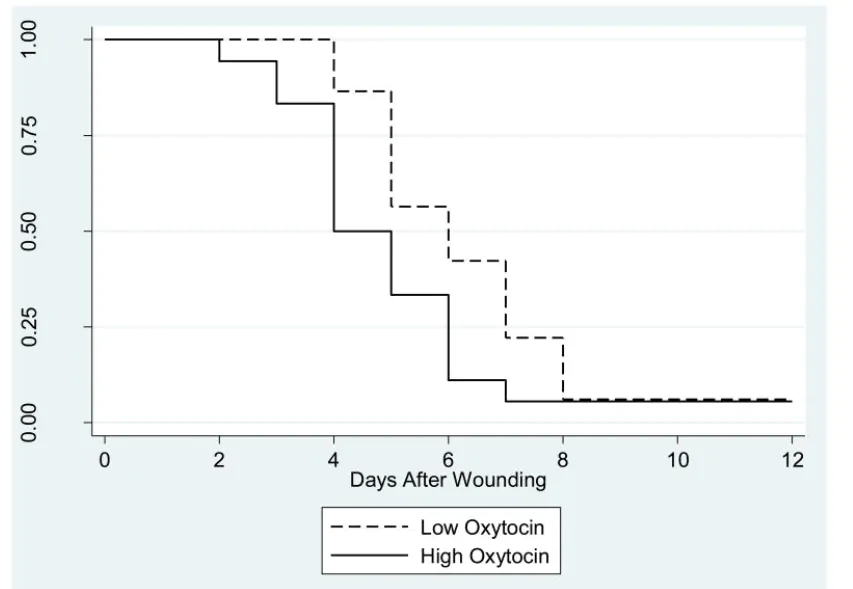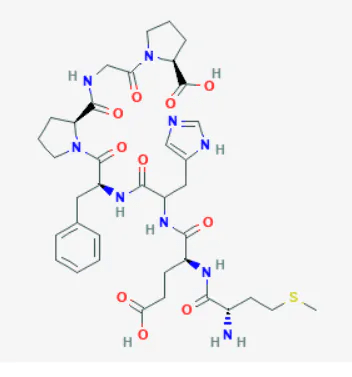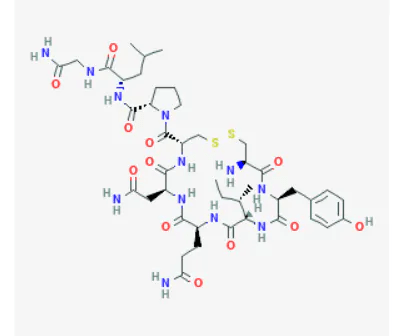Oxytocin in Wound Healing
Several studies have explored the role of oxytocin in the healing process:
One study examined the relationship between marital behavior, oxytocin, vasopressin, and wound healing. Scientists found that oxytocin levels were associated with faster wound healing in married couples.
Another research explored the role of microbial symbionts in wound healing. It was found that these symbionts accelerated wound healing, potentially through the involvement of oxytocin.

Comparison of time to escape a maze in male (A) and female (B) mice under stress. Oxytocin returns escape latency to near the same levels of controls, apparently offsetting some of the learning deficits caused by stress.
Source: PubMed
Studying Oxytocin in Cardiovascular Risk
Research on the potential role of oxytocin peptide in cardiovascular risk is an emerging study area. While oxytocin is primarily known for its involvement in social bonding and childbirth, recent research has suggested its potential effects on cardiovascular health.
Blood Pressure: Studies have shown that oxytocin may have a blood pressure-lowering effect. It has been suggested that oxytocin promotes vasodilation and reduces peripheral resistance, decreasing blood pressure levels.
Atherosclerosis: Some studies have indicated that oxytocin may play a role in regulating inflammation and lipid metabolism, which are key factors in the development of atherosclerosis. Oxytocin has been found to reduce pro-inflammatory cytokines and inhibit the formation of foam cells, which are involved in the progression of atherosclerotic plaques.
Cardiac Function: Research suggests that oxytocin may have cardioprotective effects. It has been shown to enhance cardiac contractility, improve myocardial function, and reduce oxidative stress in animal models of heart failure.
Diabetes Management
While oxytocin is mainly involved in social bonding and childbirth, emerging research suggests its potential effects on diabetes management.
Insulin Sensitivity: In animal studies, Oxytocin has been found to improve insulin sensitivity. It may enhance the uptake and utilization of glucose by peripheral tissues, leading to better blood sugar control.
Appetite and Food Intake: Oxytocin has also been implicated in the regulation of appetite and food intake. Studies have shown that oxytocin can reduce food cravings, potentially helping individuals with diabetes manage their dietary choices and weight.
Inflammation and Oxidative Stress: Diabetes is associated with chronic inflammation and increased oxidative stress. Oxytocin has been shown to possess anti-inflammatory and antioxidant properties, which could have potential benefits for individuals with diabetes.
Beta-cell Function: Oxytocin receptors responsible for producing insulin are present in pancreatic beta cells. Some studies suggest that oxytocin may promote the survival and function of beta cells, potentially protecting against their dysfunction or loss in diabetes.
Cognitive Performance
Working Memory and Executive Function
Research has shown that oxytocin can affect working memory and executive function. A study published in the Journal of Cognitive Neuroscience found that oxytocin administration improved working memory and executive control, which are important for decision-making, problem-solving, and attention.
Delay of Gratification and Flexibility:
Oxytocin has been implicated in improving delay of gratification and cognitive flexibility. One research found that oxytocin enhances the ability to delay gratification and exhibit cognitive flexibility, which is crucial for self-control and adapting to changing situations.

Comparison of time to escape a maze in male (A) and female (B) mice under stress. Oxytocin returns escape latency to near the same levels of controls, apparently offsetting some of the learning deficits caused by stress.
Source: PubMed
Memory Encoding
Another aspect of cognitive performance is memory encoding. Research has explored the timing and conditions under which oxytocin influences memory encoding. A recent study indicated that oxytocin administration may enhance memory consolidation and retrieval processes, potentially improving overall memory performance.
Oxytocin Research and Anxiety
Research on oxytocin and anxiety has revealed that the oxytocin system may play a role in human anxiety states and anxiety-related disorders. Studies have explored the acute and chronic effects of oxytocin on various aspects of anxiety, including separation anxiety disorder, specific phobias, social anxiety, and generalized anxiety disorder. The oxytocin system's involvement in anxiety has been examined through preclinical and clinical research, highlighting its potential therapeutic applications.
One critical appraisal suggests that oxytocin may have both acute and chronic effects on anxiety-related behaviors. It has been found to enhance trust, cooperation, and other affiliative behaviors while reducing anxiety-like responses. Additionally, research has shown that oxytocin can improve delay of gratification and cognitive flexibility, which are important factors in anxiety regulation.
Studies examining oxytocin levels in individuals with social anxiety disorder have indicated potential alterations compared to healthy controls. However, findings related to oxytocin levels and anxiety have not been consistent across all studies, warranting further investigation.
The oxytocin system's role in anxiety disorders has been evaluated through translational and therapeutic approaches. This research aims to understand the underlying mechanisms and identify possible oxytocin-related biomarkers for anxiety and mood disorders.
Oxytocin Research and Hunger
Research on oxytocin and hunger has revealed intriguing insights into the effects of oxytocin on eating behavior and appetite regulation. Studies have explored the role of oxytocin in appetite loss, food intake control, and the potential use of oxytocin as an appetite suppressant.
One study found that oxytocin administration reduced reward-driven food intake without significantly affecting hunger-driven food consumption. This suggests that oxytocin may play a role in modulating food reward systems and influencing eating behavior.
Another review article discussed the effects of oxytocin on appetite regulation, food intake, and metabolism in humans. It highlighted the potential role of oxytocin in hunger-driven eating, satiety signals, and overall appetite management.
Additionally, research has indicated that oxytocin can curb calorie intake by promoting food-specific increases in satiety. Oxytocin has also been shown to reduce reward-driven food intake in humans, further supporting its potential as a regulator of eating behavior.
Furthermore, investigations into endogenous oxytocin levels have shown a relationship between oxytocin and food intake. While the exact mechanisms are not fully understood, it is suggested that central oxytocin pathways may be involved in macronutrient-specific regulation of food intake.
Oxytocin and Old Muscle
Research has shown that oxytocin, often called the "trust hormone," may benefit old muscle tissue. Studies have indicated that intranasal oxytocin administration can improve lean muscle mass and help rejuvenate aging muscles. Oxytocin release has been found to increase with age and is associated with muscle maintenance. These findings suggest that regulating oxytocin levels could potentially help prevent age-related declines in muscle tissue.
Please note that all the articles and product information provided on this website are intended for informational and educational purposes only.
The products offered on this platform are specifically designed for in-vitro studies, meaning they are conducted outside the body. It is important to clarify that these products are not medicines or drugs, and the FDA has not approved them for the prevention, treatment, or cure of any medical condition, ailment, or disease.


